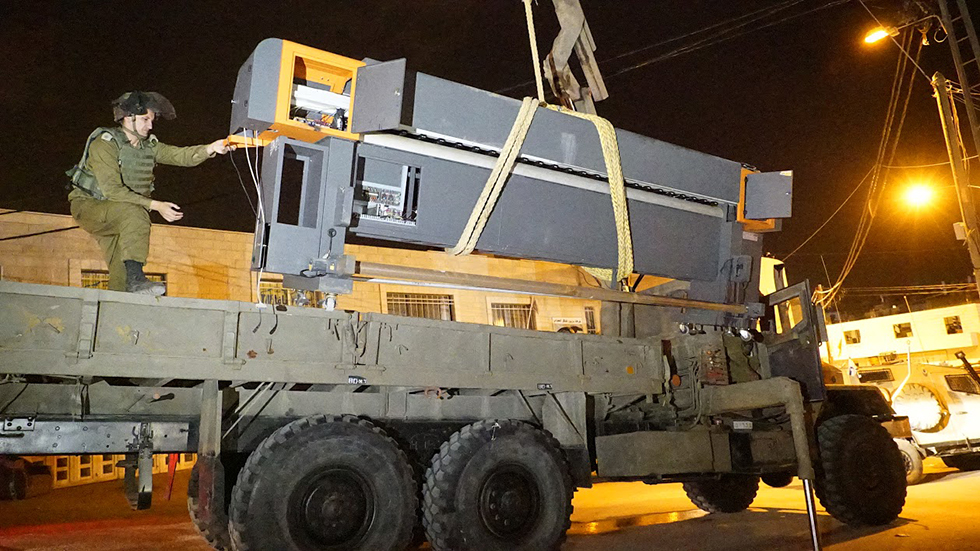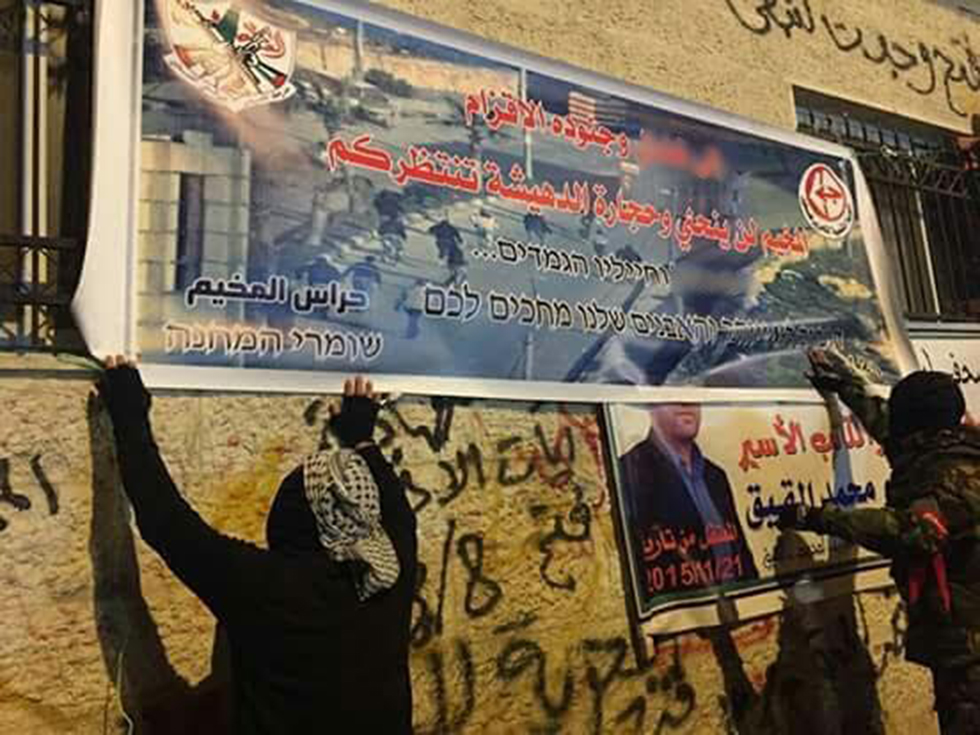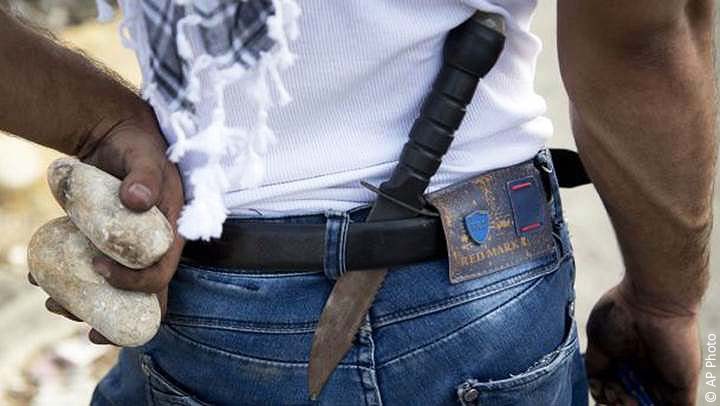What happened to all the stabbing attacks?
Analysis: A combination of goodwill gestures by the IDF, better tactical operations, and proactive measures taken by the Palestinian security services has discouraged Palestinians from carrying out stabbing attacks in the past few weeks.
Yoav Zitun
Ynet.com, April 11
Is the third intifada coming to its end? Six months since Eitam and Na’ama Heinkin were murdered near Nablus, the attack that symbolizes the beginning of what grew into a popular yet unorganized intifada which claimed the lives of 34 Israelis, the most recent data points to a dramatic drop in terror attacks.
The last substantial terror attack took place more than two weeks ago, when two terrorists stabbed two soldiers in the Tel Rumeida neighborhood of Hebron, lightly to moderately wounding the latter two. Ironically, what happened 11 minutes later could have escalated the violent uprising; a Kfir Brigade soldier arrived at the scene as reinforcement and shot one of the terrorists who lying, neutralized on the ground. Despite fear of reprisals, Palestinians have not carried out new attacks. In fact, officers in the West Bank Division have said that Palestinian officials have relayed to them that the Israeli public and military response to the incident has calmed Palestinian desire to exact revenge.
“Since successful lone wolf attacks inspire new attacks, if we succeed in preventing successful (attacks) for three weeks or a month, it is plausible that the terror wave will end,” remarked a senior officer in the IDF Central Command and it appears that he is correct. No one in the IDF is prepared to declare that the intifada is behind us and while some have moved in that direction, the West Bank Division has continued to develop new and creative measures to further reinforce stability.
 IDF confiscates printer in Dheisheh refugee camp (Photo:IDF spokesperson) Roman Gofman, commander of the IDF’s Gush Etzion Brigade, has succeeded in stopping tens of attacks at the Gush Etzion junction, offering “carrots” to lighten the atmosphere. “The young Palestinian generation is frustrated and despairing; they are looking for hope,” a senior officer in the West Bank Division told Ynet.
Gofman has held many candid talks in recent weeks with village leaders and he acceded to a request of the head of the Al-Arroub refugee camp to open the rear entrances to the village to lower the number of rock throwing incidents on Route 60, where Israeli cars travel. In a nearby village, Beit Ummar, another major stone throwing site, Gofman is helping build a soccer field for village youth. Moreover, in the entrances to large villages, the army is assisting Palestinians in building orderly parking lots for service taxis, which will decrease the traffic.
At the behest of the Palestinians in Beit Ummar, the IDF is also arranging for the transfer of a cemetery to a location further away from Route 60 to decrease rock throwing at Israeli cars during funerals. Additionally, the army has returned some cars and engineering tools used for illegal building.
“This generation does know Jews. 50 percent of them have not left the village where they were raised. They don’t know what houses in Ashdod and Ashkelon that their forefathers built or beaches in Tel Aviv look like. So what will a 16-year-old Palestinian do after completing his studies?”
After a week long siege on Beit Fajar because two of its residents carried out attacks near Ariel, local leaders gathered their youth and called on them to stop the violence. Similar gatherings have taken place in Sair and Qabatiya. “The Palestinian security services are also doing much more to stop the terror wave,” a senior security official admitted. They are searching the bags of students to find knives and are succeeding in stopping lone wolf terrorists. Additionally, the IDF has raided improvised weapons factories, where the Carl Gustav is produced, and is fighting against incitement.” Regarding incitement, the security establishment initially struggled to address the issue, but recently territorial divisions in the West Bank have created new methods to fight against inciters. Just as the IDF searches for and arrests individuals calling for unrest or the murder of Jews on the radio, the IDF now takes similar action when it comes to incitement on the internet. In addition, the Gush Etzion Brigade is required to arrest at least three Palestinians who spread incitement weekly.
 Anti-IDF poster (Photo: IDF spokesperson) The weekly operation takes place from the military headquarters of territorial brigades near the Gush Etzion junction by an officer from the Civil Administration and an intelligence gathering officer. They collect inciting videos, pictures, and posts uploaded to Facebook and then send them to the legal advisor of the West Bank Division. Thereafter, the IDF arrests the inciter and puts him in front of a court.
“The evidence that we gather before the arrest is enough to bring someone to court or send the inciter to prison for six months to a year. We are talking about people with no security history,” notes an officer. “Being satisfied with the intelligence that we receive from Unit 8200 (an Israeli Intelligence Corps unit – ed.) is too passive. 90 percent of the Palestinian adults have Facebook and we discovered that they are using it primarily in the night between 11:00PM and 2:00AM. We are talking about 1.5 million Facebook users, who are mostly men.”
“What causes attacks today is incitement on Facebook – not mosque leaflets. We arrested a Facebook inciter from Halhoul who has thousands of followers. Following such arrests, we feel a drop in the number of attacks from the same village. And in the case in which we are struggling to gather sufficient evidence to arrest inciters, we go to them at night and warn them.”
The IDF is continuing to take offensive action against incitement deep in the West Bank. A few weeks ago, the IDF discovered leaflets, bearing the picture of the Shin Bet coordinator in Bethlehem and a call to attack him. Then, on Tuesday night, Kfir Brigade soldiers entered the Dheisheh refugee camp and confiscated the private printer, which had printed the leaflets. “The owner of the print shop would have preferred to be arrested and imprisoned instead of his printer being confiscated, which costs hundreds of thousands of shekels,” remarked an officer.
In light of the recent reports that Israel and the Palestinian Authority are negotiating the entry of IDF forces into area A only in exceptional circumstances, it is possible that such a confiscation operation will not be approved in a number of weeks or months. Field officers in the West Bank Division have not expressed their opinion on the topic, but they note the importance of the IDF’s freedom of movement in villages and cities. The soldiers, who entered the Dheisheh refugee camp and were stoned in their bulletproof cars, said: “It is good that the energy of the same kids is directed against us and not Israeli cars in Efrat.”
But these activities by the Etzion Territorial Brigade are also shadowed by the dark cloud of the Hebron shooter. The soldiers of the Shimshon Battalion, in which the suspect soldier served, have been operating in the Etzion area for nearly six months, and have foiled dozens of attempted attacks, with no previous instances of that kind. The Gush Etzion Junction has also experienced a period of calm, due to the elite Maglan unit’s activities in the area, as well as the implementation of orders forbidding Palestinian pedestrians from passing through the complex, and the introduction of special cameras that can identify unusual movement and alert security forces.
The IDF thankfully embraces every day that passes without further incidents inspired and supported by the Hebron soldier, and its commanders’ attempts to halt such incidents from occurring are ongoing. The West Bank Division even put consultants in touch with territorial brigades, in order to assist in instructing the soldiers in proper conduct on moral, operational, and legal levels, with regards to controversial events such as the Hebron incident.
“We gave the soldiers a questionnaire about that incident, to make sure they understood what’s right. The impression is that, from the level of platoon commanders and upward, their understanding is that the soldier’s actions were wrong. That’s why we’re investing in the lower-level commanders, such as squad leaders and soldiers in the field, who absorb most of the mental stress from the numerous events (in which they take part).”
BACK TO TOP
|









